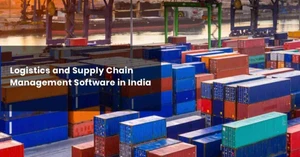What are SCM softwares?
SCM (Supply Chain Management) Software is used for managing supply chain transactions, administering supplier relationships, and handling various business procedures related to it. Supply chain analytics software helps companies ensure the smooth flow of goods, finances, and data with regard to a product or service.
Here are some common functionalities offered by logistics and SCM softwares:
- Customer requirement handling
- Purchase order management
- Sales and distribution channel
- Inventory and warehouse management
- Goods receipt and other documents
- Supplier or vendor sourcing
Another key aspect of using supply chain simulation software is the provision of forecasting; Supply Management Software enhances the business processes by solving the disparity between supply and demand with the help of consumption analysis and business intelligence algorithms.
Most Common Features of SCM softwares
- Inventory Management: Supply Chain Management offers a comprehensive inventory management module that ensures that organizations have a sufficient amount of raw materials, finished goods, and components at all times. Supply chain management software also helps in ensuring that there are no delays, bottlenecks, or stoppage in production because of material shortage.
- Forecasting and Business Intelligence: The best SCM software helps organizations through business forecasts for achieving operational efficiency. Logistics and supply chain management software overpasses the huge difference between supply and demand to reduce the wastage of resources. Supply chain analytics software uses past data to improve the scheduling of inventory and production cycles.
- Order Management: Supply chain simulation software helps in the automated creation and handling of purchase order documents. Supply management software decreases the time, money, and effort required to create a purchase order document. The streamlined billing system does it for the user. Supply chain analytics software also tracks the status of every purchase order to make sure that you do not skip a payment by mistake.
- Logistics and Shipping Status: Supply chain management software facilitates the efficient coordination of transportation channels to enhance delivery performance and boost customer satisfaction. It helps users stay informed about the current whereabouts of their shipments and status. Supply management software further assists in storage optimization, labeling, labor handling, and much more.
- Data Security: Data security is at the heart of supply chain analytics software. The best supply chain software provides network monitoring, virus scanning, audit trailing, data encryption, fault tolerance, etc. This allows companies to maintain complete confidentiality of their workflow, business ideas, mart rates, among many other things.
- Warehouse Management: A well-designed supply chain and logistics management software support accurate monitoring of warehouse functions. This allows companies to work in an organized fashion, where they can regularly monitor:
- Incoming and outgoing of goods
- Study the supply and demand cycles
- Locate goods in the warehouse.
- Storage planning to decrease operational costs and eliminate bottlenecks
- Transportation Management: Supply chain analytics software enables companies to handle supplies in transit. It has a fleet management module that lets users/employees/supervisors to check the status of their shipment going through various means of transport such as rail, road, sea, or air in real-time.
Benefits of Supply Chain Management Tools and Software
Here are some benefits companies can get from using the best supply chain software:
- Reduction in Expenses: A good supply chain management software performs a comprehensive cost analysis of the complete workflow and identifies the extra expenses in each process such as inventory, fleet operations, etc.
- Boosting Efficiency: SCM software enables companies to boost their productivity in terms of communication and coordination with their vendors, third-party fleet handlers, and suppliers. It facilitates a constant flow of information on both sides for efficient working.
- Profitability: Logistics and supply chain management software increase the profit margin for companies through various means. By streamlining the entire workflow through one platform, it ensures better supply chain management. Supply management software uses automation on several levels to cut extra costs to boost revenues as well.
- Streamlined Communication: SCM software facilitates communication between different individuals or teams involved in the handling of goods for better collaboration and higher productivity. Supply chain analytics software provides both companies and their vendors & suppliers, an in-built communication portal to stay informed regarding the status of their goods during the transportation process.
- Accurate Post-Delivery operations: Supply chain simulation software helps in managing proper documentation of all the delivered goods with bills and various other important details such as – the time of delivery, the person receiving the delivery, the contact information of the fleet handler, etc. Supply chain management software ensures that the organizations have a complete record of their distribution and delivery channels to avoid any disparity.
Types of Supply Chain Management Software
Here are some important types of supply chain management software:
- Inventory Tools: Supply management software allows users to stay updated with the most important aspect of their operations, i.e., storage. Supply chain analytics software consistently surveys the movement of goods in storage and their refilling rates to understand the supply and demand cycle. Supply chain management software also manages the daily operations within a warehouse such as a cycle counting, daily dispatching with respect to a sales order, etc.
- Freight Handling: Freight handling features of a supply chain simulation software enable users to track their goods in transit. It also helps users adhere to transport compliances, such as, cold chain logistics require to keep their goods transferred in refrigerated conditions. Users/companies can track the air conditioner status in real-time and check whether it was on or off, what was the temperature, etc.
- Supplier Management: Supplier management tools are there in the best logistics and supply chain management software. It helps in managing cost issues, performance analysis, trade history, etc. Supplier management tools reflect the history of business partnerships and its effect on the supply chain process.
- Supply Chain Analytics Software: Supply chain analytics software allows companies to assess consumer demand and their supplier’s performance along with a detailed analysis of their workflow. Supply chain analysis software facilitates complete visibility into the physical inventory, performance, and health of the company.
- Collaboration Portals: Supply chain management software offers a separate portal for users to collaborate and handle tasks that require the involvement of third-party teams such as procurement. These portals allow suppliers to connect with supply chain managers/supervisors in real-time and eliminate bottlenecks in order and requisition. Collaboration portals also help in staying updated with order forecasts, product specifications, production progress, etc.
How to find a good SCM Software?
- Full SCM suite or point solution: Full SCM suites help manage the entire supply chain operations, unlike point solutions that look at only some steps of a supply chain. Make sure to check which type of solution your business requires.
- Company size: Cloud-based supply chain solutions are quite popular among small businesses owing to their affordable subscription plans. However, an on-premises supply chain management solution ensures better control over data security. Larger organizations often prefer the hybrid model with critical data stored on-premises while another workload is on the cloud.
- Data insights: Supply chain management tools would provide aggregate supplier and buyer data for managing the warehouse and inventory operations. Therefore, select a platform that is based on machine learning and artificial intelligence.
- Real-time visibility: Real-time visibility is essential to map out the goods in supply so that all potential disruptions and issues can be handled efficiently.
- ERP integration: Well, this feature is essential if your supply chain process in expanding and you need more critical functionalities to manage job scheduling, real-time resource management, and more.
- Scalability: Choose the right SCM software that can scale as your business grows in terms of operations and the number of users. Go for a supply chain management tool with customization options to address the scalability factor.
- Forecasting: AI-enabled supply chain management software provides the forecast for upcoming supply and demand these. These trends help businesses scale up or scale down their operations accordingly.
Supply Chain Management Software Trends
Online Purchases: Supply chain software helps with strategic sourcing, demand planning, and collaboration. These features come in handy for suppliers who take products from manufacturers to warehouses and then send them to the customers who place online orders.
Online purchases have become so convenient because of the integrated supply chain management system, which helps with order fulfillment, supply management, customer profiling, and lot tracking.
SaaS: Many businesses are adopting for cloud-based supply chain management software to manage online purchasing and collaborative networking directly through the web browser. SaaS-based supply chain solutions help standardize product information according to global standards and create advanced notices for shipping.
Business intelligence: Supply chain management solution offers insights for monitoring internal inefficiencies in an organization. Then there are dashboards and scorecards that provide data about the company's performance and other KPIs.
Business intelligence functionalities for supply chain tools help enterprises forecast the demand and supply. The software also streamlines the product delivery process, starting from raw materials procurement to the final delivery.
Managing labour in warehouses: Labour management is a critical part of the supply chain process. Besides using supply chain management tools for logistics management, businesses also use this tool for shift management and labor cost optimization. SCM software is also used for enhancing cross-team collaboration and reducing errors associated with order deliveries.
3D Printing in Manufacturing: 3D online printing as compared to traditional printing saves the costs associated with recycling, unused goods, waste material, etc. 3D printing with the help of a computer helps in layering and joining parts to simulate the final product.
Typical Users of Supply Chain Management Software
- Third-Party Logistics Companies: Such companies require third-party logistics tools to manage transportation, warehouse functions and orders. SCM software also helps with customer profiling and lot tracking.
- Manufacturing Firms: Manufacturing software can be integrated with supply chain solutions to manage sourcing from suppliers, demand forecasting, costs management, and collaboration with customers.
- Distributors: Distributors have to interact with multiple suppliers and customers. SCM solution is critical for them to manage the contracts with suppliers, track the goods in transit, and keep a tab on inventory status.
- Retailers: Retailers deploy SCM softwares for strategic planning, controlling inventory, managing, transportation, and warehouse management.
Supply Chain Software Vs ERP Software
ERP software is concerned with the internal processes in an organization along with administrative tasks. Whereas, supply chain management software is primarily concerned with handling the raw materials from suppliers and the supply to customers.
ERP software further helps with product planning, production of goods, customer management, and front-end or back-office operations. SCM software, on the other, is outward-focused and concerned with the collaboration with customers and suppliers and tracking the goods in transit.
Let's have a look at Supply chain Software Vs ERP Software in detail:
| Supply Chain Management Software | ERP Software |
| External Processes | Internal Processes |
| Task Based | Relationship Based |
| Detailed & Specialized Type | Comprehensive Type |





















